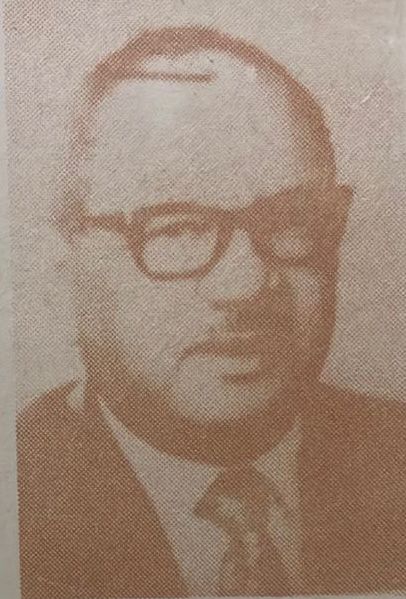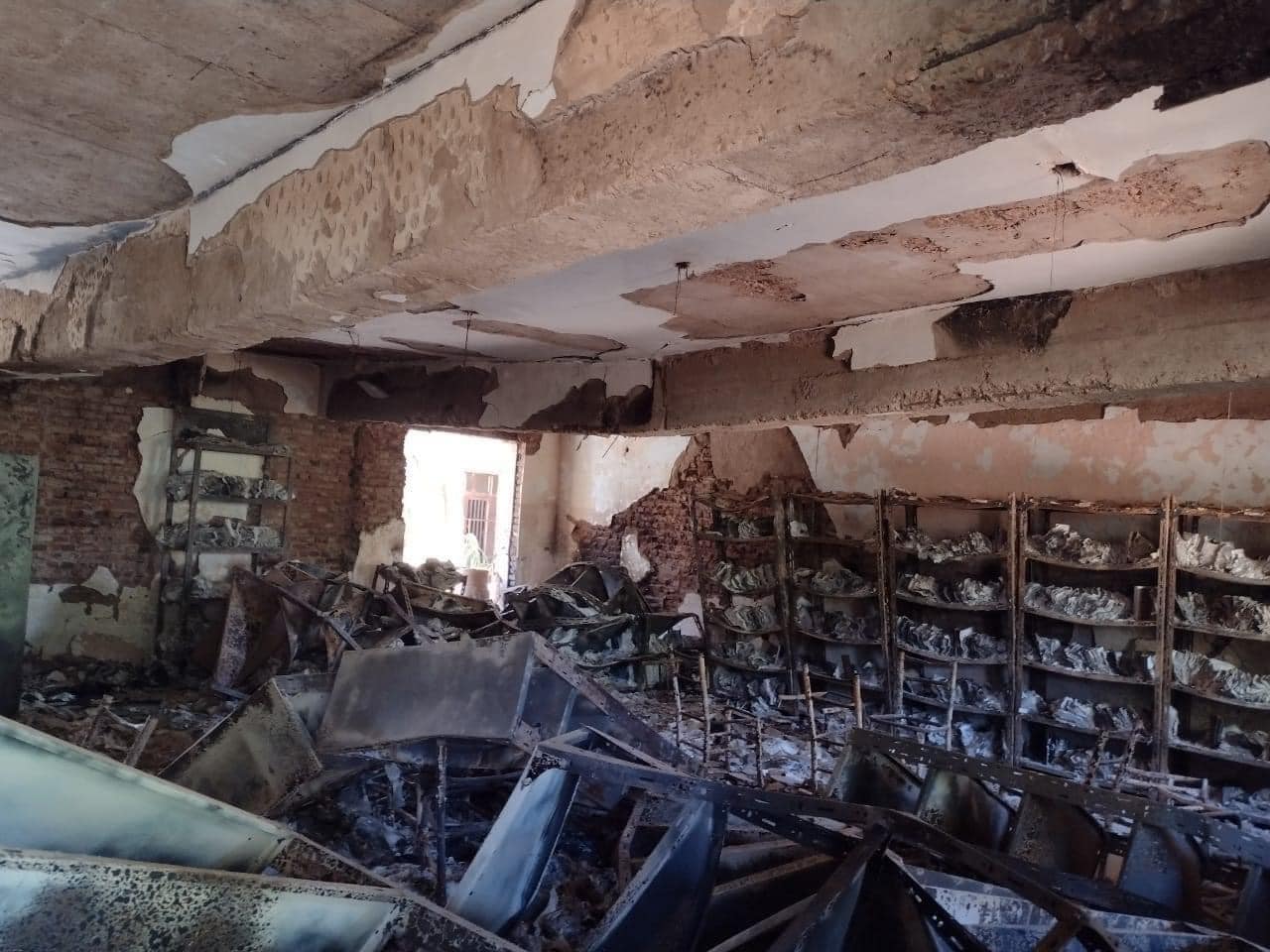The attack on Sudan’s heritage, the destruction of an invaluable library
10 June 2023
The ongoing conflict in Sudan, now entering the eighth week, has endangered hundreds of Sudanese peoples’ lives –and now their own cultural identity may also be at risk. Sudanese scholars were stunned last month when a fire consumed one of the most important libraries in the country at Professor Mohamed Omer Bashir’s Centre for Sudanese Studies at Omdurman Ahlia University, established thirty years ago.
The destruction of the invaluable library took place in the capital’s sister city, Omdurman, amidst the ongoing conflict of dominance between the army and the paramilitary Rapid Support Forces (RSF).
According to the Director of the center, Dr. Al-Mutassim Ahmed Al-Hajj, the methodical attack destroyed over 37 years of research. “This action took place inside an area controlled by the Rapid Support Forces,” Dr. Al-Hajj said. “We notified them, yet they did not care to respond.” According to the director, the destruction of the library was not motivated by theft but constituted a “systematic act designed to harm the private university, which is highly symbolic as a beacon for private education in the country.” It is still unclear, however, who were the perpetrators of the attack since the library does not hold any strategic military value.
The late Professor Mohamed Omer Bashir, who founded the Center, dedicated his life to collecting the centre’s contents with the support of dozens of researchers. It contained, among other things, original volumes on the political, social, and cultural heritage of Sudan. It also housed many rare books, research documents, and manuscripts handwritten by the professor himself that are impossible to find elsewhere. “The library represented a vital conservation institution for Sudanese heritage, and it served students and researchers from Sudan and other countries”, author and former Secretary General of Sudanese Writers Union, Osman Shinger, told Ayin.
A large portion of the library’s books were a donation by the family of researcher and writer Reem Abbas in 2012. “My family decided to donate all of the books belonging to my great grandfather, Al-Tijani Amer, as a way to contribute to the university,” Abbas told Ayin. “When I heard about the destruction, I felt it was a loss on so many levels, this is more than a conflict between two generals, this is a war against the people of Sudan.”

Huge Loss
In addition to the library, the centre taught Sudanese studies as a compulsory subject for first-year students in all faculties of the private university and organized seminars and workshops. A periodical magazine under the name “Themes of Cultural Science” was also published by the centre, along with several other publications.
Fatima Daw Al-Bait, a graduate of Omdurman Ahlia University, recalled her memories in the library that held rare collections of books by important figures such as Mohamed Omer Bashir, Sheikh Al-Dardiri, Izzat Farhat, Zainab Al-Bakri, among others, via a post on her Facebook page. “I remember vividly the last time I was there, and how I walked through these impressive books that left a lasting impact on me and made me decide to visit the place frequently while there [in Sudan]. I did not know that it would be my last glance at the place. I wish I had sat there longer there,” she wrote.

Identity Crisis
While the perpetrators of the attack are unknown, Shinger believes Islamists are behind the attack since it fits their agenda to “purge the Sudanese identity”. The threat of wiping out Sudan’s rich historical, cultural, and artistic heritage has remained a common tactic by Sudan’s Islamic Movement under the former ruling National Congress Party, and has historic roots dating back to the 1940s, Shinger said.
He explained that it started by Islamists under the former regime who censored cultural events at Khartoum University, closed the theatre, music, and sculpture departments at the Fine Arts College, and attempted to demolish Sudan’s historical music records in the Radio library for the past 70 – 80 years.
“Erasing Sudan’s national history is in the core ideology of the Islamic movement, as they believe that Sudan’s heritage of 7,000 years since the ancient Kush civilisation up to the Islamic invasion should be discarded, as they try to rewrite history to start when Islam entered the country or pretend that it begins with their coup in 1989,” Shinger told Ayin. This was part of a larger scheme to “reformulate” Sudanese to fit their values and beliefs. This same scenario, he added, has occurred by other Islamist groups in Iraq, and Afghanistan.
But Reem Abass believes the destruction of the library follows a systematic, destructive pattern reflective of the Rapid Support Forces. “I think the systematic destruction and burning of things is their (RSF) motto so far,” Abass said. “The motivation is just a way of completely erasing this country’s history and heritage, disempowering its population from the things they valued and things that connected them to their history and this city in particular.” Sudan’s cultural history does not always resonate with the RSF, Abass added, since many of them do not have a connection to the country’s civilization. Last Friday, a video circulating on social media featured RSF soldiers entering the M Bolheim Bioarchaeology Laboratory in Khartoum, looking at ancient skeletons thought to date as far back as 3300 – 3000 BC. But the RSF soldiers claim the bones are the work of the former regime under Omar al-Bashir. “It shows a complete lack of understanding of Sudan’s history,” Abass added, “they (RSF) don’t see any value in it.”
Endangered
Academics fear what happened to the Mohamed Omer Bahir Centre could easily occur elsewhere, in which all cultural heritage sites are erased. In April, the Director of the Sudan National History Museum expressed her concerns about the fate of all museums in Khartoum. “Museums are now without guard or censorship to protect them from looting and vandalism,” she wrote in a letter. Weeks later, the director lamented the death of all the animals based at the Natural History Museum. “I asked everyone who can pass through the university to break the locks of the cages and allow the birds and monkeys to come out – but nothing happened. We lost animals that are rare to find now in their natural habitat […] and very important for research in the Faculty of Science and for education in general,” the director said in a Facebook post.
The fears of Sudanese academics and others may, unfortunately, be realised. According to news reports, a French archaeological team has been monitoring satellite pictures of Sudan’s national museum and has recently noticed potential evidence of damage to the premises, including signs of burning. In a video posted on social media last week, armed men can be seen firing indiscriminately without explanation at Neelain University.
Given the fact the current conflict is taking place in the heart of the capital, cultural and academic institutions are vulnerable to the artillery bombardments and air strikes that have rocked Khartoum since mid-April. The National Records Office, for instance, is located only just 300 meters west of the Army’s General Command in Khartoum along with the National Museum and the National Library. Other sites in the heart of the city include the Palace Museum, the library, and the Ethnography Museum.
Shinger believes all Sudanese must accept a collective responsibility to preserve the country’s heritage as soon as the conflict stops. In the current restive environment, however, Sudanese can only hope cultural institutions will survive targeting from either warring party. Losing more cultural heritage sites, Abass says, would mean losing the city. “So much will be lost from this war, not just money or stolen furniture –but the essence of the city itself.”
A version of this report was published in collaboration with the Pan-African online magazine, “The Continent”


